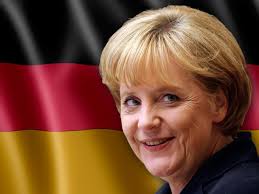The EU-Russia-Ukraine Sanctions Crisis: Germany’s Merkel says “EU taxpayers will have to subsidize Ukraine”

On October 21st, the German Economic News headlined (as translated), “Merkel: EU Taxpayers Should Finance Debt of Ukraine,” and reported that, “Angela Merkel visited [Slovakia’s Finance Minister] Robert Fico on Monday [in the Slovak capital of Bratislavia]. Both leaders demand that Kiev should take more responsibility,” and not push the EU to pay Ukraine’s past-due gas bills from Russia’s Gazprom.
Ukraine’s leader, Petro Poroshenko, was “demanding” that the EU bail out Ukraine, which is months behind on its gas bill from Gazprom, and which furthermore has been getting Slovakia to reverse flow of Russia’s gas, in order to meet Kiev’s own heating-needs.
“Ukraine and Russia negotiate Tuesday morning in Brussels about the dispute over gas supplies,” to Europe, through Ukraine’s pipelines from Russia.
“Russia demands that Ukraine pay its past-due gas bill of $4.5 billion, but doubts Kiev’s solvency.”
Merkel proposes that the EU provide a bridge-loan to help Ukraine get through the winter. She says, “It could not be expected that the EU will take over Ukraine’s gas debt to Russia. Fico’s anger is understandable.”
BusinessWeek headlined on Monday that, “Russia Won’t Accept Terms to End Sanctions Over Ukraine,” and reported that, “Russia’s top diplomat [Sergei Lavrov] said his country won’t accept [Obama’s and the EU’s] conditions to end sanctions after talks in Italy produced no breakthrough over the truce in Ukraine.” That truce is between the residents in Ukraine’s southeast, and the Ukrainian Government, which has been bombing them ever since May, in order to end their desire to break away from that Government and support instead their own republic or republics, set up by themselves. Those regions had voted at around 90% for the Ukrainian President, Viktor Yanukovych, who was overthrown on February 22 in Kiev, after America’s State Department official Victoria Nuland appointed Arseniy Yatsenyuk to lead Ukraine until a new President would be elected by voters in Ukraine’s northwest, on May 25th. The people in Ukraine’s southeast wanted to join Russia.
Russia isn’t buckling to the U.S.-EU pressures. BusinessWeek notes that Russia’s President Vladimir Putin, whose nation pipes about 15 percent of the EU’s natural gas needs through Ukraine, “said last week that supplies to Europe would be reduced if the Ukrainian government siphoned off fuel for its own use.”
So, Russia seems to be standing firm on getting its back-due payments from Ukraine, and on refusing to accept the West’s conditions for ending sanctions against Russia, and on prohibiting Ukraine from reverse-flowing any more of Russia’s gas.
Russia thus seems to be standing firm on everything pertaining to Ukraine and the EU. If this will keep up, then the EU’s taxpayers could end up paying a very hefty price for ‘winning’ Ukraine to join the EU.
The United States, by comparison, suffers very little from the entire matter.

